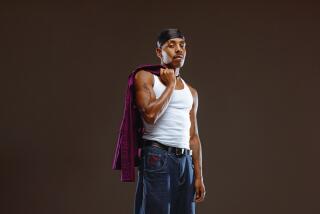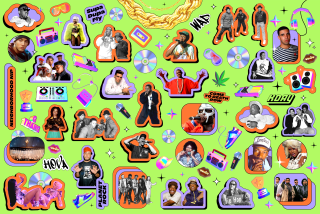O.C. Pop Music Review : King Sunny Ministers to the Joys of Juju
- Share via
SAN JUAN CAPISTRANO — King Sunny Ade will tell you that he didn’t invent the Nigerian-bred pop music known as juju . Instead, he’ll give credit to such musicians as his mentor, Tunde Nightengale, with whom he played in the mid-’60s.
But Ade can take credit not only for introducing a generation of Americans to juju but for stirring up U.S. interest in African popular music as a whole. When the Island label released Ade’s “Juju Music” in the early ‘80s, it attracted wide interest among the college/alternative set and others just tired of the same old, same old pop dribble.
The hit from the album “Ja Fun Mi” typified the genre: multilayered percussion, embellished with steel and electric guitar and floating, often rhythmically counter-pointed vocal harmonies. The elements came together in a groove so seductive that even die-hard punk fans couldn’t help but get up and move.
Ade still has that groove, as he proved during his two-hour-plus show at the Coach House Monday night. But while the style and instrumentation of his ensemble has stayed the same, tunes such as “Ja Fun Mi” have evolved with variations that keep the familiar number fresh. The Stones may get away with playing “Brown Sugar” much as they did 20 years ago, but Ade and company have chosen to add vastly different wrinkles. Isn’t that what being an artist is all about?
The 16-piece band assembled piecemeal before our eyes. Two hand drummers came out and established a beat, followed by the rattling buzz of the bead-covered shekere and a pair of talking drums. Soon, maracas and congas were in place, creating an intense percussive fabric. Then came the bass, keyboard, guitars and, finally, Ade.
*
The group maintained an insistent, up-tempo drive through the first three numbers while Ade and his four-man vocal section circled the stage in roughly choreographed steps. A cooler pace then was established, leading into the strains of a “Ja Fun Mi” that moved dreamily, with spontaneous vocal-breaks popping up during the chorus and appropriately moody solos from Jonah Williams’ keyboard, Fatoke Abiodun’s steel guitar and Ade’s own snappy electric guitar.
From there, it was back to more heated grooves speckled with more unexpected vocal breaks and flashing patter from the talking drums. Though one of the best things about the band is the salty twang it derives from slightly off-key guitars, the ensemble work was executed with tight precision as the vocal and instrumental sections stopped and started as one.
The only other rhythmic breather came when Ade dedicated a number as a prayer to his homeland, “to keep it cool.” With only the slightest embellishment from a single talking drum, four harmonizing reverent voices took on gospel flavors as they melded into a honey-colored whole.
The concert ended as it began: The ensemble deconstructed as it exited from the stage, leaving only the barest percussive threads hanging. This revealed the various parts of Ade’s infectious formula and was itself a lesson in counterpoint and polyrhythm. As our own pop music evolves into more basic rhythmic and harmonic forms, it’s refreshing to hear what contrasting detail can do. It’s no wonder that in his homeland, Ade is known as “Minister of Enjoyment.”
More to Read
The biggest entertainment stories
Get our big stories about Hollywood, film, television, music, arts, culture and more right in your inbox as soon as they publish.
You may occasionally receive promotional content from the Los Angeles Times.










